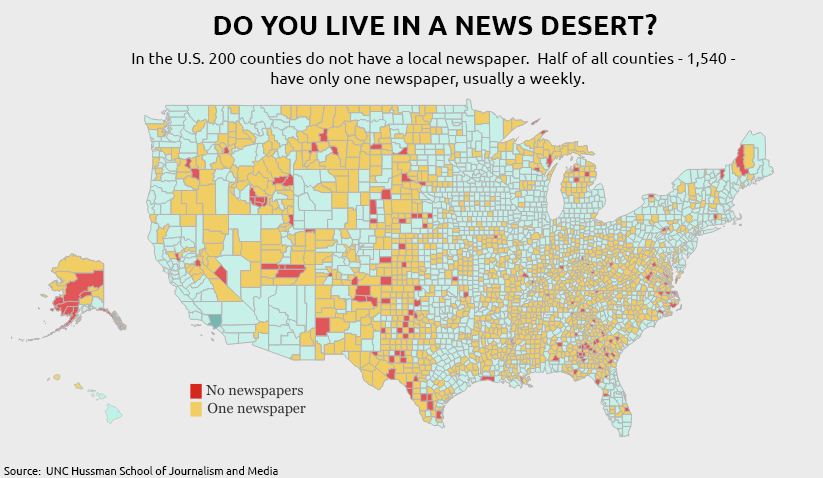With the rise of the digital age, access to news and information has become easier than ever before. However, despite the vast amount of news that is available online or through social media applications, there are still areas in the United States and around the world that suffer from a phenomenon known as "news deserts." The Columbia Journalism Review defines news deserts as "a media desert or news desert is essentially an uncovered geographical area that has few or no news outlets and receives little coverage." To expand on this definition, news deserts are regions where local news coverage is scarce or non-existent, leaving communities without reliable and relevant information about their own neighborhoods, towns, or cities. According to a Washington Post online news article, one-third of American newspapers that existed about two decades ago will be out of business already by 2025. Another statistic from a Seattle Times online news article explains that more than 2,500 newspapers, which are primarily local coverage, have closed since 2005.
News deserts are a growing concern, particularly in rural or low-income areas, where local news organizations may struggle to survive due to economic challenges, consolidation of media ownership, and changing consumer behavior. As traditional local newspapers and broadcast stations face declining revenues and reduced resources, they may cut back or shut down operations, leaving gaps in local news coverage. This can further exacerbate existing inequalities, as residents may lack access to information and news about local resources, government decisions, school board meetings, community events, and other important issues that affect people's daily lives or impact their well-being.
The consequences of news deserts are significant. According to usnewsdeserts.com, the number of newspapers in North Carolina alone has decreased by 22% between 2004 and 2019. One of the primary challenges of this is the lack of information. When communities lack access to reliable local news, residents may be uninformed about critical issues, such as changes in local policies, upcoming elections, or public health alerts. This can lead to a decrease in civic engagement, as residents are unable to make informed decisions or participate in community discourse. It also limits the ability of communities to hold local officials and institutions accountable for their actions, which is essential for a healthy democracy. Local journalism serves as a watchdog and without strong local news coverage, there is a higher risk of corruption, mismanagement, and abuse of power going unchecked.
Furthermore, news deserts can disproportionately impact vulnerable communities. Rural areas, low-income neighborhoods, minority populations, youth populations and even small businesses often face the brunt of news deserts, as they may have limited internet access, language barriers, or other challenges that further hinder their ability to access reliable local news. News deserts can affect minority communities, including racial and ethnic minorities, as well as non-English speaking communities. Limited local news coverage can result in reduced representation and coverage of minority voices, issues, and perspectives, leading to a lack of diversity. News deserts also have implications for youth and education. Access to reliable news coverage is critical for fostering media literacy and critical thinking skills among young people. When local news coverage is lacking, it can greatly hinder youth's ability to be informed and engaged citizens, which could possibly have long-term consequences for their engagement in society. Additionally, small businesses and companies often rely on local news for advertising and market research. These news deserts can potentially limit these opportunities, immensely impacting their ability to reach customers, make informed decisions, and thrive economically. This ultimately makes it harder for these communities to stay informed and engaged and potentially widens the gap between different segments of society.
Economically, news deserts can also have negative consequences. Local journalism plays a crucial role in supporting the local economy by providing advertising and job opportunities. Local news organizations are sources of local employment, including journalists, reporters, photographers, editors, and other supporting staff members. When local news outlets struggle for business, downsize or close down, it can result in the loss of local jobs and impact the economic vitality of a community as well as reduced employment opportunities in the media industry. Reduced availability of local news coverage may also discourage businesses or families from investing in the area or hinder local economic development efforts. Local news coverage can influence people's perceptions of a community's livability, safety, and desirability. When there is little to no media coverage of local issues, it can greatly affect how a community is seen, affecting the real estate market and property values.
To address the challenge of news deserts, it is imperative to recognize the critical role of local journalism in supporting democracy and communities. Efforts are actively being made to combat news deserts, including initiatives from non-profit organizations, philanthropic foundations, and community-driven journalism projects. Some news organizations are experimenting with new business models, such as non-profit or cooperative ownership, to sustain local journalism in underserved areas. Additionally, some governments and policymakers have recognized the importance of local news and are exploring policies and regulations to support local journalism.
News deserts pose significant challenges to communities and democracy. The consequences of news deserts are far-reaching, affecting not only the information landscape but also the social, economic, and political fabric of communities. Without access to trustworthy news, people may become more susceptible to misinformation, polarization, and disengagement from civic life. In addition, the lack of media coverage on local issues, such as local government, education, and public health, can have real-world impacts and effects on people's lives. Addressing the challenges of news deserts requires a multi-faceted approach involving policy, innovation, collaboration, and community engagement. By recognizing the value of local journalism and taking proactive steps to support it, we can mitigate the consequences of news deserts and foster a more informed, engaged, and democratic society.






No comments:
Post a Comment